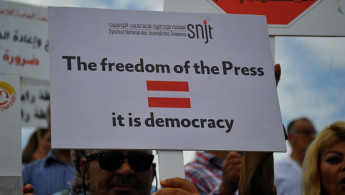Tunisian groups call for withdrawal of 'threatening' cybercrime decree
Five Tunisian organisations and unions Thursday called on authorities to withdraw a cybercrime decree they said could further stifle criticism of President Kais Saied and his government.
The powerful UGTT labour union, the Tunisian Order of Lawyers, the Tunisian Federation of Journal Directors, the National Syndicate of Tunisian Journalists, and the Tunisian League for Human Rights issued a joint statement against the legal proclamation.
The statement called for the complete withdrawal of Decree No. 54 "as it contradicts the goals of the [2011] revolution … and contains threats against anyone who initiates an opinion contrary to the authority."
The groups said that referring journalists and other media workers to the judiciary was "a systematic attack on freedom of expression and the press" which aimed to continue silencing opposition.
The decree was part of "a trend aimed at suffocating media institutions economically and socially and forcing them to stop working," the statement said.
"It is a dangerous escalation aimed at limiting the right of citizens to obtain accurate information, and access public debate about policies for managing the current crisis," it continued.
The unions announced the launch of a national campaign to pressure Saied’s administration to withdraw the controversial decree, and called for participation from all of Tunisia’s media institutions.
"Eleven years ago, the Tunisian people rose up against a dictator. Today, they are back to square one."@AlessandraBajec examines how Tunisia's new constitution will enshrine Kais Saied's one-man rule 👇 https://t.co/qhXkur8DSY
— The New Arab (@The_NewArab) July 15, 2022
On 13 September, Saied issued Decree No. 54 to "fight crimes related to information and communication systems".
It was slammed by numerous rights organisations which said it would allow Tunisian security forces to "violate Tunisians’ digital privacy" and "represented a serious and unprecedented attack on freedoms in the country."
Those found guilty of violating the law could face up to five years imprisonment.
Since a power grab in July 2021, President Saied has issued a string of widely criticised presidential decrees cementing one-man rule and imposing limits on freedom of speech, including Decree No. 54.
A new constitution – which effectively cancelled constitutional amendments made in 2014 – has given Saied sweeping powers.
Saied has defended his moves, saying they were necessary to safeguard Tunisia from corruption which he says became widespread.
The North African country is currently in the grips of a severe financial and economic crisis that has included fuel and food shortages.




 Follow the Middle East's top stories in English at The New Arab on Google News
Follow the Middle East's top stories in English at The New Arab on Google News


